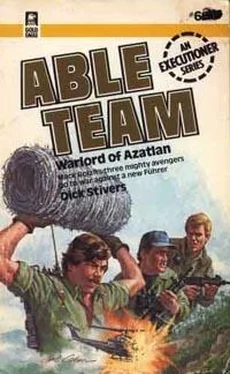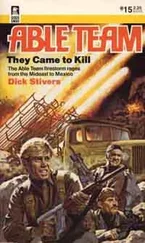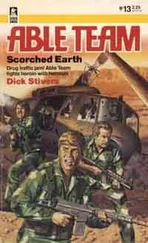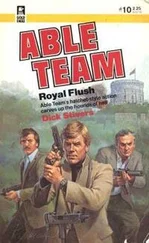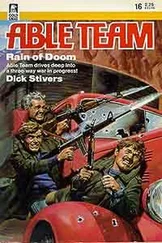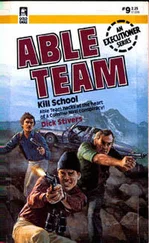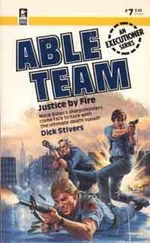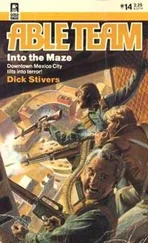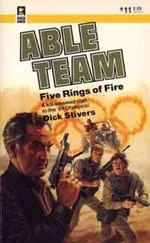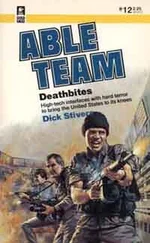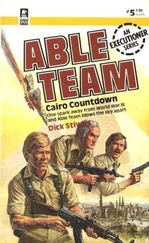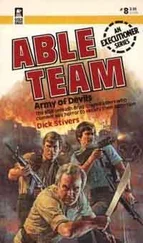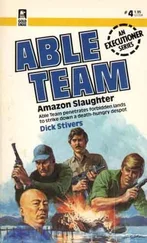"Rub this mud on my shirt," Horton whispered. He slapped the white short-sleeved dress shirt he wore.
Butterfield understood. He wore a dark sports coat over his white shirt. But Horton, in bleached and starched white, would stand out like a beacon.
They slapped mud on one another, on their faces and shirts, as the pickup bounced over the desert. His face masked desert-brown, Horton eased his eyes above the gully.
Against the light of the flaming car, he saw a skirmish line of four men heading toward them. The truck paced them, high beams and side-mounted spotlights bathing the desert. A weapon popped from the pickup bed.
No, not a weapon, not a rocket or a grenade launcher, Horton realized as a white sun seared away the night.
A flare.
He turned to Butterfield and saw him staring up at the blazing magnesium. "Don't look at it! It'll kill your night-vision..."
"Oh, God, Al," Butterfield groaned. "We're up against paramilitaries..."
"It's all right, it's all right. It's a big desert and they only have fifteen minutes to find us. We don't have to shoot it out. We just have to stay out of sight."
Slugs ripped through the brush above them. Butterfield flinched, then scrambled away on his hands and knees, dragging his shotgun through the sand and grit. The barrel and stock clattered on rocks. The shadows around him shifted rhythmically as the flare swung on the end of its miniature parachute.
Horton waited until the flare sputtered out, then ran after Butterfield. He heard another flare pop. He threw himself down on his panicked friend. As the second flare's white glare lit the area, Horton held Butterfield down and whispered to him.
"Don't move while the flares are up. They can only see us if we move while the flares are up. It's a big desert, thousands of square miles, they can't find us. Keep cool, they can't find us."
Autobursts ripped through the brush. High-velocity slugs zipped into the distance. Ricochets hummed past. They heard the clang-pop of more 40mm grenades. A grenade rushed over them, exploded twenty yards away. Bits of steel showered them.
"They're just shooting wild, it's just dumb shit recon-by-fire. Wait until the flare..."
Darkness returned. Horton ran again, keeping his back below the level of the gully walls. He heard Butterfield stumbling behind him.
Shotgun blast! Horton threw himself flat as another flare burst above him. He looked back to see Butterfield crawling over a tangle of rocks and windblown creosote branches.
He knew what had happened. Butterfield had fallen and hit his shotgun on a rock. Ithacas do not have a dependable safety. Cocked and with a round in the chamber, the weapon had discharged.
Horton pumped his weapon to chamber the first shotshell. Now they would fight. Because of Butterfield's stumbling and the accidental discharge, they would fight. Two men with .38 pistols and shotguns against a squad of paramilitary gunmen with automatic weapons and grenades and illumination. Horton thought of abandoning Butterfield to die alone. No. Never.
Never leave your wounded, never leave your men to the enemy. Horton could not disobey his Airborne discipline, no matter how many years ago the Fort Ord instructors had screamed the words into his head. He could not leave a man he had worked with for months, who had covered him, who had faced death in the doorways and alleys of the drug world with him. Bursts of high-velocity slugs ripped over them. Twigs fell, rocks clattered. A grenade popped only a few feet away, the shrapnel tearing through the brush above them. But the gully sheltered them.
Horton attempted a joke. "Get with it, partner. This is the shoot-out. Make them eat lead."
As the flarelight sputtered away, Horton crawled to the gully side. He looked up. He saw the flashing barrel of a gunman silhouetted against the 4WD's headlights. Pushing in his Ithaca's safety, he put the shotgun's front sight on the center of the gunman's chest, and squeezed the trigger.
The man dropped. Horton slid down as burst after burst searched for him. A grenade flashed, throwing dirt and chopped mesquite over him. Butterfield crawled to him. Horton gave him commands in a hiss.
"Keep moving! That way. Dump the sand out of that barrel before you try to fire it."
Butterfield tried to speak, but could not. Horton shoved him on as bullets puffed dust only an arm's length above them.
A form jumped into the gully. Horton lay still, watching the darkness, his shotgun on line.
Light bathed the brush and rocks. Horton saw a shoulder and the side of a head above a tangle, twenty yards away. He sighted, and he waited.
The gunman raised his M-16. Horton fired a blast of Number Six birdshot into the man's face.
Screaming, his face and part of a hand gone, the gunman thrashed in the dust. Blood sprayed from his destroyed mouth as he called out in Spanish to the others.
Horton pumped his weapon to chamber another round, and waited for the flarelight to give him another target.
The air above him exploded with shrapnel and slugs. A heavy-caliber machine gun hammered at the gully, the dirt exploding with the impacts of slugs and grenade blasts.
Behind Horton, Butterfield fired his shotgun once, twice. Then a tight-throated whine became a scream as an autoburst raked Butterfield's legs. Horton scrambled as he saw a form with a flashing muzzle.
Raising his shotgun, Horton fired at the same instant as his target, hundreds of tiny lead balls racing to kill the gunman even as a 40mm fragmentation grenade struck only inches from Horton's feet.
His legs were instantly shredded. Blood gushed from a thousand wounds. He struggled to work the shotgun's pump action. But his left arm did not function.
Dropping the shotgun, he jerked the .38 pistol from the holster at the small of his back.
A boot stomped down on his arm. Horton looked up into the muzzle of an M-16. He never saw the flash, never felt the burst that ended his life.
Gray in the first minutes of dawn, the boulevards, parks and public buildings of Washington, D.C. wheeled below as the Air Force jet banked and took a route to the south-southwest.
Hermann "Gadgets" Schwarz, electronics and communications specialist for Able Team, looked to the east. He saw the incandescent disk of the sun rising above light-marked suburbs in Maryland and Delaware. Headlights streaked the expressways as commuters traveled to the capital. The ex-Green Beret radioman, veteran of wars in Southeast Asia, the Americas and the Middle East, smiled at the irony.
All we government employees, on our way to work. You to your offices. Me to...
"Guatemala," Andrzej Konzaki said from the conference table. The wide-shouldered, legless ex-Marine put a pointer to Central America. "You'll be landing in five hours at Guatemala International."
"This an official visit?" Rosario Blancanales asked. A calm, quiet ex-Green Beret born in Puerto Rico, Blancanales served as medic, interpreter and indigenous operations specialist for Able Team. Like Gadgets, Blancanales still wore his pajamas. The call to Stony Man had awakened them at 4:00 a.m.
Carl Lyons interrupted before Konzaki could answer Blancanales. The cynical ex-LAPD officer, hardened and scarred by wars in the streets of Los Angeles, and more recently in the secret dirty wars fought by Able Team, had a reputation that did not include courtesy.
"What does Guatemala have to do with Texas? The call said something happened in Texas."
"To paraphrase an old English preacher," Konzaki told them. " 'No nation is an island.' Even those surrounded by water. Not anymore. What happened is this..."
Konzaki read from a notebook of photocopied documents and top-secret memos. "Throughout the past several months, in fact the last few years, the FBI has been working on several gangs running weapons into Central America. They've traced the serial numbers of weapons captured in El Salvador back to Miami and Los Angeles..."
Читать дальше
